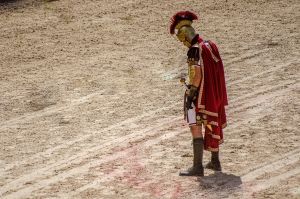
Hi Friend,
In 1776 Edward Gibbon published the first volume of The Decline and Fall of the Roman Empire. By 1789 he had published the last volume ironically written during the time of America’s crucible of independence. It is considered by many historians to be one of the five greatest historical works ever written. It’s also considered one of the greatest expressions of the English language.
Rome was the first world Superpower. Her culture was so pervasive that a man could travel from what is now Ireland all the way to Iraq and still be under Roman rule. From the beginning to the end of his travel Latin was the only language he needed. One currency was recognized, and one law was enforced in every territory he crossed.
Today a man making this same trip would cross possibly a dozen national borders with almost as many changes in language and currency.
The influence of ancient Roman law and accompanying Greek culture is still imprinted on 21st century western civilization and every person living in it. The impact was equally strong during Gibbon’s day inspiring him to travel to Rome to see the cradle of English law. One afternoon he was sitting on the Capitoline Hill overlooking the Forum which had by then become a cow pasture. He pondered the irony of cows grazing on ground once trod by Roman noblemen. Yet as Gibbon sat at what had been the epicenter of civilization, he saw only remnants of what once was. Where Roman Senators had discussed weighty matters of law, hooded monks were now moving quietly about a pasture of cattle.
How could this be? Sitting at the geographic center of a once mighty empire, Gibbon was fascinated at what was not there. Rome’s military might, economic power, law and influence had once been unequaled in the world.
So he decided to write the History of the Decline and Fall of this superpower.
Gibbon recognized several major factors that contributed to this great fall. While there were more issues than space permits here, a few come to immediate attention. One of the major causes was the influence money had on Roman politicians. In a word, they were bought. Financial interests reigned supreme, and politicians compromised values for money. Justice was overcome by greed.
Second, political infighting became so intense that the Roman constitution eventually became little more than words on paper. Men sought power with such ferocity that little respect was paid to the rights of individuals and long-term consequences were ignored in order to achieve short-term gains.
Third, political partisanship rendered Roman leadership incapable of dealing with seemingly simple conflicts in the Middle East. A revival occurred in Iran among religious extremists which eventually spread over the Roman Empire threatening its existence. The citizens of Rome ultimately lost confidence in their leaders. The confusion that resulted allowed Pompey and Caesar almost unlimited power when they took office.
Citizens were willing to give up their freedom to achieve security which led to the loss of a constitutional government and the ascendancy to power of their first dictator, Julius Caesar.
Caesar (the name from which the contemporary word Czar is derived) became dictator in 48 B.C. followed by a firestorm of assassinations and violent deaths of men such at Cato, Cicero, Pompey and eventually Caesar himself. The writings of these men played an important role in the founding of the only other Superpower the world has known; the United States of America. It was also the climate in which Jesus Christ was born just four decades later.
By the time Christianity emerged on the scene men such as Caligula and Nero had taken the throne. Nero ordered the death of the Apostle Paul. A few short decades later when the Apostle John was writing the Book of Revelation he used the term 666 (Rev. 13:18) as a symbol for the Beast power that some commentators recognize as a code for the dictatorial power exercised by the Roman Emperors who by this time were unchecked by any constitutional restraints.
The Caesars which followed (Caesar had by this time become a title) unleashed a reign of terror against Christians.
If these trends have more than a vague similarity to current events and what may yet occur it should serve as both a warning and hope. It’s a warning against allowing any man to have unlimited power.
It is hope because the teachings of Christ have endured. The bones of the Caesars have returned to dust, yet the teachings of Jesus have influenced the world more than any man or government that has ever lived.
The principles that have endured are the principles by which the world to come will be governed.
The promise to those who witnessed the resurrection that “this same Jesus, which is taken up from you into heaven, shall so come in like manner as ye have seen him go into heaven” (Acts 1:11) is yet unfulfilled. We, like the patriarchs of ages past wait as pilgrims among foreign rulers. (Heb. 11:13) But we wait in firm hope for a government of justice ruled by the only human leader to ever restrain his unlimited power so he could reign for an unlimited time.
May that time come soon!
Until next time,
Jim O’Brien
